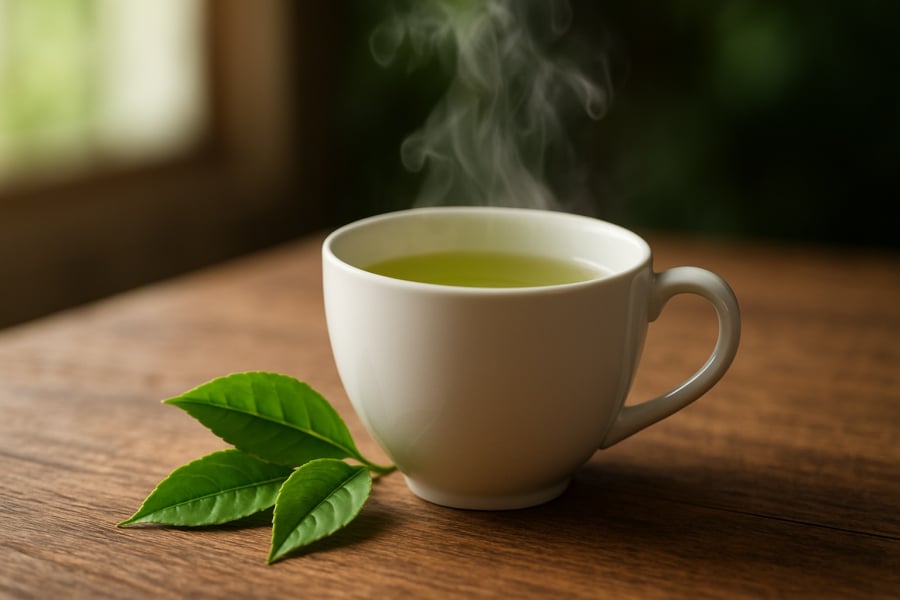Green Tea – Nature’s Shield for Your Heart
High cholesterol has long been recognized as a major risk factor for serious cardiovascular diseases such as stroke, heart attack, and coronary artery disease. According to the Vietnam Cardiovascular Association, the number of people with dyslipidemia is rapidly increasing, especially in young people.
In this context, green tea, a beverage intimately associated with Asian culture, is gaining recognition from international scientific research for its potential cardiovascular benefits. A meta-analysis published in the Journal of Nutrition (2020), encompassing 31 studies, revealed that green tea significantly reduces LDL cholesterol (“bad” cholesterol) and total cholesterol levels in the blood.
The key lies in EGCG, a potent catechin found in green tea leaves. This compound exhibits strong antioxidant properties, inhibiting plaque formation in blood vessels and reducing inflammatory responses, thereby improving blood circulation and protecting the vascular endothelium.
Moreover, the polyphenols in green tea provide additional support by enhancing endothelial function. The endothelium is a crucial layer of cells lining the blood vessels, responsible for regulating blood pressure and preventing atherosclerosis.

Naturally Supports Stable Blood Sugar Levels
Green tea is not only beneficial for cardiovascular health but also a powerful ally in blood sugar management, especially for those with prediabetes or type 2 diabetes.
A 2019 Healthline study, consolidating 27 investigations into the effects of green tea, demonstrated that regular consumption lowers fasting blood glucose levels, enhances insulin sensitivity, and reduces HbA1c levels, which reflect average blood sugar control over the past 2–3 months.
Additionally, a separate analysis published in the Journal of Diabetes Investigation confirmed that habitual green tea drinking is associated with a lower risk of developing diabetes, especially when substituted for sugary drinks such as soft drinks, milk tea, or coffee with milk.
Dr. Le Thi Phuong, former Director of the Center for Vietnamese Oriental Medicine Inheritance and Application, shared on Vietnamnet: “Green tea has an astringent and cooling property. It not only helps to clear heat but also supports detoxification, diuresis, lowers blood lipids, and stabilizes blood sugar thanks to its natural compounds like EGCG and polyphenols. However, it is important to pay attention to the dosage and avoid drinking it on an empty stomach.”

How to Drink Green Tea the Right Way for Optimal Benefits
While green tea is highly regarded for its health benefits, it should be consumed in a sensible manner. Experts recommend the following:
- Drink it in the morning or 30–60 minutes after a meal to avoid irritating the stomach.
- Avoid brewing extremely strong tea or consuming excessive amounts daily. The recommended intake is typically 2–3 cups of diluted green tea per day.
- Refrain from drinking tea right before bedtime due to its caffeine content, which may disrupt sleep.
Additionally, individuals with low blood pressure, gastric ulcers, pregnant women, or those who are breastfeeding should consult their doctors before incorporating green tea into their daily routine.
In Conclusion: A Cup of Tea, Countless Health Benefits
In today’s fast-paced world, where chronic conditions like high cholesterol and diabetes are becoming increasingly prevalent, incorporating small yet healthy habits – such as drinking green tea daily – can make a significant difference to your long-term health.
A daily cup of tea is not only a refined habit but also a precious gift to your body. So, why not start today?
Sufferers of These 5 Conditions Should Refrain from Eating Durian
“Durian is an incredibly unique and delectable fruit with an intense aroma and a creamy, rich flavor. Its pungent fragrance and bold taste are not for the faint-hearted, but for those who appreciate its complex sensory experience. While some may find its strong odor off-putting, others are drawn to its intriguing, almost addictive, flavor. The durian fruit is an acquired taste, and those who embrace its uniqueness are rewarded with a truly memorable culinary adventure.”





































